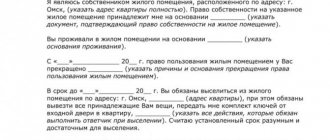Is it possible to evict an ex-husband from an apartment?
This question may arise before a woman after she has divorced her husband, no matter how much time has passed since the date of divorce. After all, some married couples coexist quite peacefully in the same living space. And in some cases, husbands themselves leave the apartment to their ex-wife, not wanting to waste their time and nerves. This question can be answered in the negative only in two cases:
- the husband was the owner of the apartment (or its share) before marriage, and when living together, did not draw up a deed of gift for his wife;
- the husband inherited an apartment, regardless of whether this happened before legal marriage or not.
In other words, if during the marriage the wife only had the right to use her husband’s apartment, then the ex-husband will not be evicted.
Example. In 2010, Zuev V.P. entered into marriage with Gaeva I.R. and from that time on they began to live in a rented apartment. After 5 years, Zuev V.P. received an inheritance in the form of a four-room apartment and the couple moved into it. In 2021 Gaeva I.R. decided to divorce her husband, filed a claim in court for divorce and division of jointly acquired property, including an apartment. Zuev V.P. filed a counterclaim against his wife to evict her from the apartment due to the loss of grounds for residence and the court fully satisfied his demands, citing the fact that property received during marriage in accordance with the rules of inheritance law is not jointly acquired.
In all other cases, the ex-husband can be evicted under certain circumstances. It is better if this happens voluntarily, but often you still have to contact the judicial authorities.
Is it possible to evict an ex-wife and child?
When you are the owner of a home, driving out your ex-wife will not be difficult. But having a common child radically changes things, since the child has the right to a share of the property of either parent. Also, a minor can live in his father’s apartment, even if the parents have already divorced. This circumstance does not give the ex-wife the right to be there, but if the child is too young (under one year old), then, as a rule, the court takes this circumstance into account in favor of the woman. And then the husband cannot kick her out, and sometimes she is not even allowed to divorce.
During the trial, a decision may be made on the temporary residence of the mother in the apartment of her ex-husband along with the child. Within the established time frame, the woman is supposed to find another place of residence and work. If this is not possible, and the father pays child support, he may be required to find housing for his ex-wife and their common child, which is not inferior in terms of conditions to the current one. This is how the law protects the rights of minors.
If the ex-wife, with whom she has a common child, owns some kind of housing or can be sheltered by close relatives, then the court will most likely side with the husband.
It is possible to evict an ex-wife with a small child, but is it worth doing? It is difficult for a single mother to get a job, and finding a place for a child in a nursery is a real problem. Financial problems are also a big obstacle to finding a rented apartment: you can’t really get around on maternity leave. Try to take a responsible attitude towards the fate of your child and take into account all the circumstances of the situation before going to court.
See also:
Property shares during a divorce: determining their size by peaceful means and through the court
Reasons
In order to evict your ex-spouse from the apartment, you simply need to actually get a divorce. After all, in accordance with part 4 of Art. 31 of the Housing Code of the Russian Federation, the termination of family relations already entails the loss of the right to use the apartment by the former spouse. However, this statement is true only if the owner of the apartment is the wife.
If the apartment is municipal, then the following reasons may be grounds for eviction of the spouse:
- his absence for a long time, actual residence at a different address;
- use of the apartment for other purposes;
- amoral behavior;
- systematic long-term non-payment of utility bills (over 6 months);
- intentional damage or destruction of residential premises, its parts and communication systems.
All the grounds listed above apply not only to former spouses who were officially married, but also to couples who cohabited (the so-called “civil marriage”).
Methods
There are two main ways to evict your ex-spouse from an apartment:
- voluntarily;
- forcibly.
Naturally, the first option is preferable for a woman, since she will not have to waste time and money on the procedure for eviction of her ex-husband in the courts. However, men do not always “leave gracefully.”
By forced eviction, we mean an appeal to the authorities, which will already take measures for expulsion and eviction (court, FSSP, Department of Internal Affairs of the Ministry of Internal Affairs of the Russian Federation, etc.). These methods include:
- if the owner goes to court with a claim to recognize her ex-spouse as a person who has lost the right to use the apartment, having received a positive court decision, sends a copy of it to the Department of Internal Affairs of the Ministry of Internal Affairs of the Russian Federation (previously this service was called the Federal Migration Service of the Russian Federation) and removes the spouse from the registration register;
- if the apartment is transferred into the ownership of third parties (under a contract of sale, gift, etc.), who in turn turn to the judicial authorities and evict the ex-husband of the previous owner who is illegally living there;
- if a married couple lived in an apartment owned by third parties under a lease agreement, then after its expiration the woman has the right to enter into a new lease agreement with the owners only for herself and evict her husband;
- if the ex-spouse was temporarily registered in Russia and his period of stay has expired;
- If the spouses, upon entering into a marriage, drew up a marriage contract and it specified the conditions for using the apartment after a divorce, then disputes are resolved in accordance with its provisions.
As you can see, there are a lot of ways to evict your ex-spouse from an apartment after a divorce. The list above is not exhaustive, so it is always better to seek advice from experienced lawyers, as many cases are individual and have no common analogues.
Example. Gruzdev V.P., after divorcing his wife Gruzdeva G.N., refused to move out of the apartment she owned. Gruzdeva G.N. turned to a lawyer who helped her draw up a statement of claim, collect the necessary documents and represented her interests in court, proving during the hearings that the ex-husband of his trustee does not have the right to use the apartment and is subject to eviction. However, despite the court decision Gruzdev V.P. did not want to voluntarily leave the apartment. Then the lawyer, acting on behalf of Gruzdeva G.N. appealed to the FSSP, whose employees ensured the forced eviction of the ex-husband from the apartment.
Eviction methods
It would seem easy to evict an ex-wife or husband from your own apartment. The person should be reminded of his rights and responsibilities and enjoy the spectacle of furiously packing his suitcases. But if all former partners realized the truth and voluntarily left their home after a divorce, then you would not now be looking for the answer to the question of how to drive away an uninvited neighbor. So, there are two ways to evict former spouses from an apartment:
- Voluntary. Constructive dialogue and a farewell slam of the door - this is the ideal eviction of an ex-partner. After this, it’s not a sin to throw a party, but there are not many cases of voluntary departure of an ex-husband or wife. All decent and conscientious people run away on their own without talking or reminding. And those who are more insolent do not want to lose their free place of residence and look for a new one. And it’s too expensive to remove a corner these days. Therefore, we want to warn you that you should not hope for such a favorable outcome of events. And whoever is forewarned is forearmed.
- Forced. If the ex-husband prefers not to listen to his wife’s monologues about a speedy eviction, and still watches TV casually, scattering sandwich crumbs around, then it’s time to bring in the heavy artillery. Contact the court with a request to forcibly evict the person from your apartment. The ex will receive a couple of reminders from the court, and if he doesn’t get it, gentle bailiffs will come and lead him away.
See also:
Options for dividing a municipal apartment
Remember that you can only try to evict your spouse from the apartment if you are its rightful owner. If the housing belongs to both of you, you need to divide the property and decide what to do with the property - sell it and divide it, or you will give the value of your spouse’s share in cash.
How to evict your ex-husband from your apartment?
The most difficult and time-consuming option for evicting a former spouse from an apartment is to appeal to the judicial authorities. Let's figure out how to do this correctly and get a positive result.
Procedure and procedure
Let's consider the algorithm of actions that must be performed in order to evict the ex-spouse:
- Try to resolve this issue with your spouse out of court. Send him a demand for eviction (can be sent by registered mail with notification or delivered in person). Even if this attempt is unsuccessful, you will have evidence for the court that you wanted to resolve the matter peacefully.
- Go to court with a statement of claim to evict your ex-spouse from the apartment.
- Get a court decision. If it turns out not to be in your favor, then bring the complaint to a higher authority within the period established by law.
- Apply with the court decision to the Department of Internal Affairs of the Ministry of Internal Affairs of Russia, where you can file an application for deregistration.
- Send the defendant an eviction notice indicating specific deadlines for vacating the living space, as well as the removal of all things (including large furniture, animals, etc.).
- Contact the FSSP with an eviction application, wait for the bailiffs and say goodbye to your ex-husband.
Not all points of this algorithm are mandatory and in each specific situation it is necessary to consider all the nuances and features of a particular dispute.
Example. Borkov I.P. cohabited with Kotkina D.V. and lived in her apartment. Since Borkov I.P. was a citizen of Georgia and lived in Russia with a temporary permit, then Kotkina D.V. registered him in her privatized apartment. After the actual termination of the relationship, Kotkina repeatedly asked Borkov I.P. leave her apartment, but he refused, citing the fact that he had no housing in Russia. Kotkina filed a lawsuit. In accordance with the decision of the authority Borkov I.P. had to move out of the apartment within 10 days, which he did.
Statement of claim
A statement of claim for eviction from the apartment of a former spouse is drawn up in accordance with the norms enshrined in the Code of Civil Procedure of the Russian Federation. As a general rule, it is sent to the district court of general jurisdiction, which serves the territory in which the defendant lives. The claim must indicate:
- the exact name of the judicial authority to which the application is submitted;
- personal and contact information of the plaintiff and defendant;
- document's name;
- link to the document establishing the ownership of housing;
- the grounds for which the former spouse is subject to eviction;
- requirements and their motivation;
- date, signature of the person filing the claim;
- list of documents attached to it.
The claim is executed in triplicate - to the judge, the defendant and the plaintiff.
.
Documentation
In order for the statement of claim to be accepted by the judge for proceedings and not left without consideration, it is necessary to collect the necessary package of documents. Depending on the situation, the list of certificates may vary, but most often it is necessary to provide the following:
- plaintiff's identity card;
- certificate of registration of ownership of the disputed housing;
- extract from the house register;
- certificate of divorce;
- demand for eviction and response to it (if any);
- receipt of payment of duty in favor of the state;
- other documents that confirm the validity of the requirements.
This is a mandatory list of documents that the court needs; if additional information is needed, the court may request them itself or oblige one of the parties to the dispute (or both) to present them at the next hearing.
Timing and cost
It is impossible to say exactly when the court will decide to evict your ex-husband from the residential premises that belong to you, since everything again depends on the specific situation: who is the owner of the property, the grounds for eviction, the financial and physical condition of the spouse, his agreement with the requirements or not. The entire process can take from several weeks to several months, and in particularly complex cases, even years.
Another mandatory condition for the claim to be considered by the court is the payment of the state fee. Since the claim for eviction of a former spouse is material, but cannot be assessed in monetary terms, the amount that will have to be paid is 300 rubles.
The plaintiff must pay it; this can be done in the following ways:
- pay at the cash desk of any bank;
- through the Gosuslug website;
- non-cash payment through terminals installed in the courthouse.
Claim for eviction from ex-spouse's apartment
Since the unlawful and willful eviction of a person from a home is prohibited, the owner must indicate his intention to evict a member of a broken family and give time for eviction. If the former family member does not voluntarily vacate the premises within the prescribed period, you will have to file an eviction claim with a judicial authority.
An application to evict a former family member can be filed with the court at the defendant’s place of residence. The document is filled out in accordance with established requirements and contains the following information:
- Full name, residential address of the plaintiff.
- Full name, residential address of the defendant.
- Contact details of the parties.
- Number of the purchase and sale agreement for the premises of the spouse-owner.
- Address of the apartment and its area.
- Grounds for eviction.
- Date of divorce.
- Name of the body that dissolved the marriage.
- Plaintiff's signature.
The text of the eviction claim states that the defendant was warned of eviction, however, did not leave the premises within the allotted time. You can include in the text of the statement the data of witnesses who can confirm the fact of family breakdown.
Copies of the following must be attached to the eviction notice:
- Documents for the apartment confirming ownership.
- Extracts from the house register.
- Birth certificates of children.
- Purchase and sale agreements.
- Divorce certificates.
- Extracts from the Unified State Register.
- Court decisions on divorce.
- A marriage contract, if it was concluded between spouses.
- A written eviction notice with a receipt stamp.
- Receipt of payment of the duty.
The plaintiff may attach any other documents if he believes that they are important for an objective consideration of the eviction case when the former family member continues to live in the apartment.
Nuances and difficulties of evicting an ex-husband:
Above, we examined the general provisions for eviction of a spouse with whom the marriage relationship has been terminated from housing. Now it is necessary to consider the features of some of the most common situations.
From a council apartment
It is worth understanding that a municipal apartment is the property of local authorities, so you cannot simply discharge your spouse at will; you must go to court, as well as to the municipality. Let's consider two options.
Ex-husband is registered
In this case, it is quite difficult to evict the husband if he does not violate the duties of the tenant, since the state protects the constitutional rights of citizens to housing. You can contact local authorities and draw up an application for the allocation of two separate residential premises, but in practice this is almost impossible to achieve. The best solution to the problem would be to resolve the dispute voluntarily.
Not registered
Here the situation is much simpler. You can read in detail about how to evict a person who is not registered in it and who is not the owner from an apartment here. After all, the ex-husband is no longer a member of the family and is actually a stranger.
From a privatized apartment
It is in this case that the most important question is whether the ex-husband is the owner of at least part of the apartment. Let's consider both options.
Owner
If the ex-spouse is the sole owner of the apartment, and it was purchased before marriage or received as an inheritance (regardless of the time of inheritance), then there is absolutely no chance to evict the former lover. If the husband is a co-owner of the apartment with his ex-wife, or the apartment was purchased during marriage and, by a court decision (or personal agreement), was divided between the spouses, then the husband can be evicted from the apartment only if his share is bought out from him.
At the same time, it does not matter whether the husband is registered in the apartment or not - in Russia the inviolability of private property is ensured, and no one can be deprived of it except in cases provided for by law (confiscation, sale at auction to pay off debts, etc.).
Not the owner
If the husband is not the owner of the privatized apartment, then the court can make a decision to evict him. Regardless of whether he is registered in the apartment or not, after a divorce he loses the right to use residential premises belonging to his ex-wife, since he actually ceases to be a member of the family.
Procedure for eviction if the apartment is the personal property of the spouse
Housing may be the personal property of the spouse planning eviction in the following cases:
- it was acquired before marriage;
- received during marriage through gratuitous transactions (donation, inheritance);
- property was transferred during division of property by court decision;
- registered in his name during the marriage, more than three years have passed since the divorce, and the second spouse did not file a claim for division of joint property.
In such situations, eviction is not particularly difficult. If the second spouse is not registered in the apartment, he must vacate the living space upon request. If you have a residence permit, you must deregister it through the court.
Proceedings in this category have one significant nuance. According to the Constitution of the Russian Federation, a citizen cannot be deprived of housing. Therefore, it is of great importance whether the evicted person has another apartment (room), or the opportunity to purchase it. If the second spouse is not provided with living space and is also experiencing financial difficulties, the court has the right to grant a deferment for eviction, the duration of which can be from 6 months. up to 1.5 years. After this period, the court decision is subject to unconditional implementation, regardless of the availability of the possibility of relocation. It should be noted that a similar eviction procedure applies to situations where housing is in shared ownership of a spouse and children, whose age does not matter.








